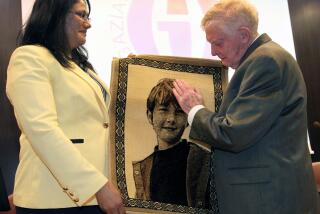Grieving Parents Work to Ease Pain of Other Young Patients
- Share via
It took Henry Garcia 11 years after his son’s death from leukemia to get involved. To walk the hall in the cancer ward on the fourth floor of Childrens Hospital. To peer in the rooms and see the faces of the nurses, of the other children who might die just like his son.
For Chris Hoefflin, even before his son died he knew only one thing to do: fight so that other children would live.
Childrens Hospital’s Center for Cancer and Blood Diseases--recognized around the world--relies significantly on charity, corporate gifts and formal grants.
But some of its donations come from parents like Garcia and Hoefflin, whose gestures to the center and childhood cancer originate in their personal tragedies: Their children were treated here and they died here.
“He was an incredible young man,” said Hoefflin, whose 10-year-old son, Michael, died in 1996 from brain cancer. “I expect to stay involved until I draw my last breath. I certainly don’t want any child to suffer what my son suffered.”
Garcia is a board member with Padres Contra Cancer, an on-site support group that works mainly with Latino families to guide them through language barriers and provide services from diagnosis through, in some cases, death.
While Michael was still living, Chris established the Michael Hoefflin Foundation, which primarily funds brain-cancer research at the center.
*
Though the survival rate for childhood cancer has risen to 75% from four decades ago when virtually all children with cancer died, many parents know too well that kids do still die. Garcia and other members of Padres recently went to funerals for two elementary school-age girls.
“The loss of a child is incomparable to anything else in this world,” said Garcia, 49, whose son, Neil Pineda, died just shy of his 15th birthday in 1988. “You laugh again. You sing again. But that’s always in the back of your mind.”
At Childrens Hospital, some parents have responded to their tragedies by helping to battle the disease. Their efforts are welcomed at a center where its director, Stuart Siegel, tries to foster such personal ties and volunteerism.
“In many cases [Siegel] gives a patient his home number, so people have an extraordinary loyalty to him,” said John Pettker, an estate planning attorney working with Siegel on a five-year fund-raising campaign for the center.
Others who contribute to the center include an anonymous donor who established a pediatric oncology chair for research at USC--with which Childrens Hospital is affiliated--for about $2 million in Siegel’s name.
Robin and Susan Richards, parents of Chase Richards, who died in 1992 when he was just 2, established the Chase Foundation, which developed and staffs a playroom in the hospital’s cancer ward. The foundation’s goal is to fund all play therapy at the hospital.
*
Garcia didn’t get involved until last year.
A member of Padres asked him to come to the hospital. He walked through the hallways, the memories rushing back. Then he sat in his car in the parking lot.
“I played back all those faces that I saw,” he said. “On the way home I thought, ‘With my position, what can I do to help?’ ”
Soon after, Garcia, director of operations for Popular Cash Express in L.A., helped bring Spanish-language variety-show host Don Francisco to Padres for a fund-raiser appearance, and raised $30,000, an unprecedented amount for the group.
Hoefflin, 45, an executive vice president of a computer technology company, leads a group of about 150 Santa Clarita Valley volunteers who have raised about $1 million in four years.
Hoefflin’s foundation offered Siegel--his son’s primary physician--$300,000, which the doctor paired with other funds to start the Michael Hoefflin Cancer Research program, which supports brain cancer research.
“We are looking forward to some really good things,” Hoefflin said.
More to Read
Sign up for Essential California
The most important California stories and recommendations in your inbox every morning.
You may occasionally receive promotional content from the Los Angeles Times.













